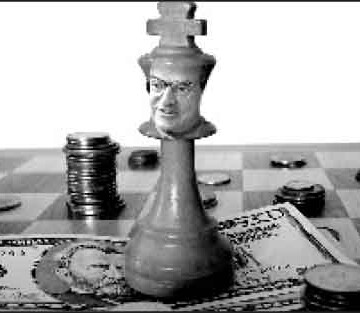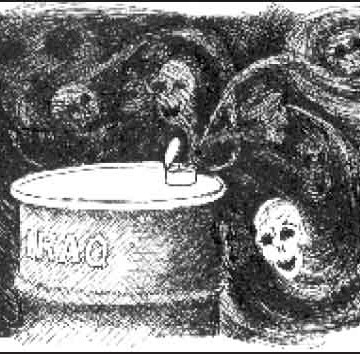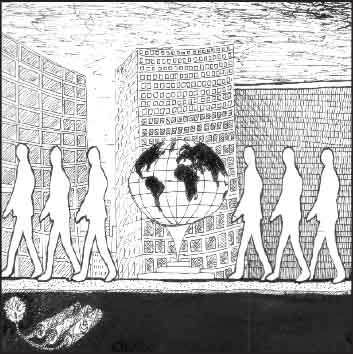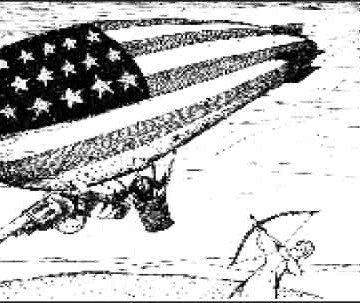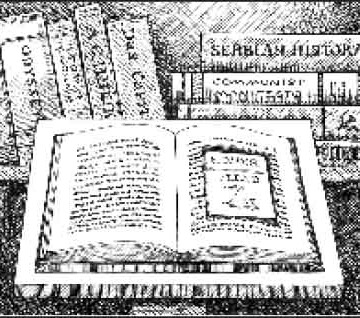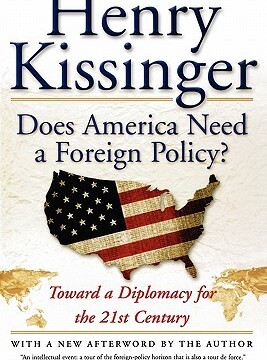A chain is as strong as its weakest link. In President Bush’s “War on Terror,” that weak link is not in the Middle East or North Africa or the Subcontinent but in Europe. For years, Chronicles has been warning that flawed pro-Muslim Western policies would turn the Balkans from a “protectorate of the New World...
Author: Srdja Trifkovic (Srdja Trifkovic)
George Soros, Postmodern Villain
George Soros was born in Budapest in 1930 but, today, spends most of his time in New York City. Not much is known about his early years. He is the only eminent “holocaust survivor” who has been accused of collaboration with the Nazis. In 1947, he managed to sneak through the Iron Curtain, and, the...
The Battle for Bush’s Ear and Soul
It is reasonable to assume that a country’s foreign policy is conducted in the interest of that country’s security and well-being and that those entrusted with its formulation and conduct will act in a coherent and rational manner. At the end of 2003, the foreign policy of the United States was neither coherent nor rational. ...
Mr. Bush and Democracy in the Middle East
In 1980, Ayatollah Khomeini told Oriana Fallaci that Western music dulls the mind. “It involves pleasure and ecstasy, similar to drugs,” he explained; it does not exalt the spirit but puts it to sleep, and “it distracts our youth who become poisoned by it.” “Even the music of Bach, Beethoven, Verdi?” Fallaci asked. “I do...
Lord Ashdown’s Balkan Fiefdom
For 200 years, the Balkan states have been manipulated by the powers of “Old Europe” to slow and control the collapse of the Ottoman Empire. They were created, enlarged, and shrunk as the need arose. During the two world wars, the territories inhabited by southern Slavs were used as bargaining chips in constructing alliances, while...
Out of Korea
Another futile round of the six-nation talks on North Korea’s nuclear program ended in Beijing last September. The communist authorities in Pyongyang subsequently declared that further negotiations involving both Koreas, China, Japan, Russia, and the United States were pointless, but China said it was working to arrange a second round of talks. For once, I...
The Iraq Quagmire
The lies and distortions surrounding the stated rationale for the war against Iraq now appear crude, clumsy, and embarrassing. While it would have been unrealistic to expect Messrs. Bush, Rumsfeld, and Wolfowitz to display Bismarckian finesse in setting up Saddam Hussein, six months after the war was declared over, their actions should be judged by...
Reforming the Military
On August 25, Secretary of Defense Donald Rumsfeld announced that he would look into ways to strengthen U.S. combat power without increasing the size of the military. While the “end-strength” of 1.4 million should stay the same, he intends to rebalance the active and reserve components, sending underutilized active-duty personnel to the reserves and moving...
Out of Africa
But for the death and suffering it has caused to thousands of innocents, the Liberian imbroglio would have an almost farcical quality—Graham Greene meets Lehar. On one side, there was the LURD (Liberians United for Reconciliation and Democracy), a ragtag army of heavily armed but poorly trained and undisciplined rebels. They nevertheless have the upper...
Exiting Iraq
It is sometimes necessary for a great power to keep a distant small country under military occupation—if need be, for a very long time. The Romans could not contemplate an “exit strategy” from Palestine in the first century A.D.—or from a few other hotspots around the empire’s outer perimeter—without compromising their status as the world’s...
Where Are Our Principles?
The E.U. Constitution, drafted by a committee chaired by former French “conservative” president Valéry Giscard d’Estaing, debuted on June 10. With a metaphysical sweep worthy of Hegel, d’Estaing described the 75-page document as “an edifice, a construction, an equilibrium, a balance . . . a synthesis.” Beethoven’s “Ode to Joy,” the anthem of the European...
Fragile Empire
There have been strong empires with weak currencies, but not often and not for long. The Soviet Union, Spain after Philip II, the Ottoman Empire after Suleiman, and an impoverished Britain after Versailles all come to mind. That financially fragile states cannot support ambitious political and military ventures is obvious to common sense and confirmed...
A Surprising Unsureness of Touch
The one surprising aspect of the controversy surrounding Iraq’s “weapons of mass destruction” is not the failure to find them: Those in the know had known all along that they did not exist. It is, rather, the Bush administration’s inept handling of a situation that should have been anticipated months ago, when the “bureaucratic” decision...
A Road Map to Nowhere?
In the aftermath of the war in Iraq, its most determined advocates predictably claimed that the United States should proceed with her alleged mission of bringing democracy to the Middle East. The advocates of this approach seek to push the Israeli-Palestinian issue into the background, to subordinate it to whatever their agenda may be in...
Iraq’s Collapse
The war in Iraq’s outcome was never in doubt, but the magnitude and speed of the Iraqi regime’s collapse are nevertheless puzzling and deserve closer scrutiny. In terms of numbers and available equipment, the Iraqi military was theoretically a foe worthy of respect. Its past performance was by no means abysmal. It suffered serious reverses...
Turkish Delights
Four weeks before the latest war against Iraq, President George W. Bush declared that it would be motivated by a “vision” of democracy and liberation for the entire Middle East. A U.S.-sponsored regime change in Baghdad, he proclaimed, would “serve as a dramatic and inspiring example of freedom for other nations in the region.” Only...
Yugoslavia, R.I.P.
On February 4, the Federal Assembly in Belgrade formally dissolved the state known as Yugoslavia and replaced it with a loose union of its remaining two republics, Serbia and Montenegro. On February 25, the separate parliaments of Serbia and Montenegro voted to nominate deputies for the new joint legislature that was then slated to elect...
Privatization in Serbia
In articles dealing with the 2002 presidential election in Serbia, I have made passing references to Zoran Djindjic as “Serbia’s kleptocratic prime minister” and to his “corrupt establishment” that “controls the economy and the media more stringently than Milosevic had ever done.” While such designations would be considered unremarkable by most of Serbia’s impoverished and...
Same Old Song and Dance
President George W. Bush painted a pleasingly simple black-and-white picture of the world in his State of the Union Address on January 28. It was a choreographed political speech with several statements of strong intent rather than a factual assessment of the nation’s current “state.” That America is strong and resolute, while Saddam Hussein is...
Europe Skeptical About NATO Enlargement
On November 21, 2002, NATO leaders meeting in Prague invited seven ex-communist nations to join their ranks in an expansion termed “historic.” The three Baltic republics of Estonia, Latvia, and Lithuania (the alliance will, for the first time, include former Soviet territory), as well as Bulgaria, Slovakia, Slovenia, and Rumania are expected to become full...
The Justification for War
During the Cold War, occasional resorts to war or threats of war by the United States were justified by the need to keep communism in check. This justification had the advantage of being based on a real threat—notably in Berlin in 1949, in Korea in 1950, and during the Cuban missile crisis in 1962. The...
Pakistan, Our Untrustworthy Partner
As the first contingent of U.N. weapons inspectors arrived in Iraq last November, U.S. government sources leaked a disturbing story about one of our key “allies” in the War on Terror. Pakistan apparently has been helping North Korea with her nuclear-weapons program for years, in return for missile technology that would strengthen her own hand...
Middle East Resources
The minefield of Middle Eastern myths, passions, and deceit is so dense that even making a factual statement may open you to accusations of bias and mendacity. It would take an entire issue of Chronicles just to provide a comprehensive bibliography and a list of the websites relevant to the Middle East. However, the non-idiot...
Another World
“What doth it profit a man if he gain control of the whole world and lose control of his country?” My first encounter with the new, post-national ruling class came in the early 1980’s. I was a young broadcaster with the BBC Yugoslav Service (as it was called then), and my work took me to...
Turkey Goes Islamic
On November 3, Islam triumphed politically in Turkey, rendering the entire U.S. strategy in the Middle East tenuous and causing dismay in Europe. Recep Tayyip Erdogan, barred from public office for Islamic agitation, led his Justice and Development Party (AKP) to a landslide victory over his secularist opponents in NATO’s only Muslim nation. Muslims will...
Francophile Pursuits
Jacques Chirac, in the last week of October, called off the Anglo-French summit scheduled for December after angrily accusing British Prime Minister Tony Blair of speaking to him with extraordinary insolence over the future of the European Union’s Common Agricultural Policy (CAP) and Africa. The French president told Mr. Blair, “You have been very rude,...
The Hollow Empire
America’s present position is paradoxical. On the one hand, her unparalleled power and wealth are reflected in the astoundingly imperialist “National Security Strategy” unveiled last October, which asserts a right to stop any country “from pursuing a military build-up in hopes of surpassing or equaling the power of the United States.” That America is a...
Baghdad or Pyongyang?
Last October, North Korea announced that it has a nuclear-weapons program. Defense Secretary Donald Rumsfeld confirmed that North Korea already has a “small number” of nuclear weapons, and a Pentagon official later added that the United States thought Pyongyang had two nuclear bombs. The stunning revelations sent shockwaves around the world, but the White House...
An Invalid Election
Serbia’s?recent presidential election failed to muster enough votes to be valid. Only 46 percent of voters cast ballots in the run-off between current Yugoslav president Vojislav Kostunica and his rival, Miroljub Labus. Kostunica beat Labus by a two-to-one margin, but, without the minimum turnout of 50 percent, the outcome was void. What happens next is...
Serbia’s Presidential Election
The current president of the soon-to-be-defunct Yugoslav Federation, Vojislav Kostunica, has won the initial stage of Serbia’s presidential elections, the first held since the fall of Slobodan Milosevic almost exactly two years ago. Kostunica garnered 31 percent of the vote, with Miroljub Labus—the “pro-Western, reformist” candidate supported by the “international community”—coming in second at 28...
Winning Another Term
Gerhard Schroeder has won another four-year term as German chancellor following his Red-Green coalition’s victory in September—the narrowest ever seen in a German election. Until just weeks before the election, he was expected to lose, and, considering his record, deservedly so. Under Chancellor Schroeder, Germany has enjoyed a double-digit unemployment rate—over four million Germans are...
The Coming War in Iraq: Dangerous and Unnecessary
In the final years of the Soviet Union, as glasnost broadened the scope of permissible public debate, it was still deemed advisable to precede any expression of controversial views with a little disclaimer. For example, “While I hold no brief for the Islamic dushmans terrorizing the people of Afghanistan, I think we should withdraw from...
Another Bailout
Brazil is about to receive another IMF bailout, funded chiefly by American taxpayers. While the main beneficiaries will be a few private banks whose loans are at risk, there is practically no public debate about the deal. This is the second Brazilian bailout in only four years. In the summer of 1998, the IMF put...
A “Communist” Education Remembered
Belgrade’s Tenth Gymnasium was a well-proportioned neoclassical building in a leafy park three miles from the city center. Built by King Alexander shortly before his ill-fated trip to Marseilles, it bore his name until the Partisans’ victory in 1945 and was considered a very good secondary school. Many of its students came from the provinces...
Corporate America in Crisis
The ongoing turmoil in America’s stock markets and a series of corporate scandals have attracted considerable attention from commentators and editorialists all over the developed world, who fear that economic instability in the United States may plunge the world’s top businesses into a vicious cycle of doubt and deferred capital investment. With the world’s stock...
Bush’s Middle East Policy: Mendacity, Folly, or Both?
On June 24, President George W. Bush delivered his long-awaited speech on the Middle East. Most of his 15-minute statement was devoted to harsh criticism of the Palestinians, including the assertion that “peace requires a new and different Palestinian leadership . . . not compromised by terrorism.” In addition to ditching Yasser Arafat and ending...
Foiling a Terrorist Plot
U.S. Intelligence claims to have foiled an Al Qaeda plot to explode a radioactive “dirty bomb” in an American city. Abdullah al-Muhajir, a 31-year-old American-born U.S. citizen of Latin American origin, made the mistake of traveling to Chicago’s O’Hare International Airport from Pakistan after concluding his terrorist training. Had he taken the trouble to travel...
Transatlantic Rifts
In the immediate aftermath of September 11, Europe was closer to America, politically and emotionally, than at any time since World War II. For a moment, the threat of Islamic terrorism had rekindled a dormant awareness on both sides of the Atlantic of just how much the Old Continent and the New World have in...
In Memoriam: Gen. Alexander Lebed, 1950-2002
When I first met General Alexander Lebed, shortly after he was forced to retire from his military career in 1995, he was a crusty soldier with great political ambitions, itching for action but visibly uncomfortable in mufti. His tie knot was too wide and his parade-ground bass sounded coarse and unmodulated. His face, with more...
Tapping into Concerns
Jean-Marie Le Pen’s success in the first round of France’s presidential election—he came in second and faced President Jacques Chirac in the final round-fell far short of a “revolution,” despite the right’s wishful thinking. The number of votes in his favor has risen only slightly since 1995, and the rout of the Socialists was primarily...
Milosevic on Trial
There are contests in which a decent person prefers not to take sides, such as the bloody wars between Mafia families or Stalin’s disputes with Trotsky and Tito. The war between Khomeini’s Iran and Saddam’s Iraq also comes to mind, or the family feud between Pol Pot and the Vietnamese communists. It is tempting to...
State of the Union: An Empire, Not a Republic
President Bush’s recent State of the Union Address was an historic occasion. His speechwriting staff went through nearly 30 drafts and finally presented him (and the rest of us) with a mature ideological framework that reflects the balance of outlooks within the present administration. The preceding debate may have been the last chance for any...
We Are the World
In the aftermath of September 11, the chairman of the House International Relations Committee noted that the war on terrorism has revealed the need to overhaul U.S. foreign policy. “Can anyone doubt that the sum of our efforts has been insufficient?” asked Rep. Henry Hyde (R-IL) on October 10, opening a hearing into the role...
Time for Arafat to Go
It is not necessarily a bad thing for a national leader to remain at the helm for a very long time, provided that he is successful. Otto von Bismarck’s 28 years as Prussia’s and then the Reich’s chief minister were marked by unification and consolidation internally, nifty diplomacy and overall stability of the European balance-of-power...
Afghanistan and Oil
Writing in the New York Times on September 26, Paul Krugman insisted that the war against Afghanistan would not be “a war on behalf of the oil companies; not even a war on behalf of SUVs and McMansions.” It was, though, going to be a war “over a natural resource that is more vital than...
Osama bin Laden: The Balkan Connection
The U.S. and British embassies were shut down in Sarajevo on October 17 after receiving threats from Bosnian Muslims and their foreign co-religionists resident in Bosnia who profess outrage at the bombing of Afghanistan. “This step has been taken due to a credible security threat to the official U.S. presence in Bosnia-Herzegovina” a U.S. official...
The Coming Ordeal
This latest book by the former secretary of state illustrates the difficulty of separating a piece of writing from its creator (Alan Greenspan on macroeconomics, Bill Gates on information technology, Steven Spielberg on cinematography. Would a similar, slim volume attract national attention if came from an assistant professor at a Midwestern college? Would it be...
Memorandum to President George W. Bush
In the aftermath of September 11, you have done a reasonably good job managing the crisis, symbolizing the nation’s unity, restraining the laptop bombardiers, and preparing a military response that was neither hasty nor disproportionate. Now that two months have passed, you have more time to reflect on the long-term significance of that event and...
A State Visit
Vicente Fox, Mexico’s president, began his state visit to Washington in September by issuing a public challenge to President George W. Bush to grant amnesty to millions of illegal Mexican aliens in the United States by year’s end. He said he wanted a “bilateral migration agreement” that would ensure that “all Mexicans entering the United...
NATO Expansion: Harmful and Dangerous
After President Bush’s meeting with Russian President Vladimir Putin in Italy in July, it is almost certain that a new round of NATO expansion will be announced at the forthcoming summit in Prague, regardless of Moscow’s misgivings. The alliance will include Slovenia, Slovakia, the three Baltic republics, and possibly Rumania and Bulgaria. The consequences of...
